Since its inception in 2018, the Small-Scale Meat Producers Association (SSMPA) has provided a strong voice for approximately 7,000 BC farmers and ranchers who raise meat outside of the conventional system. About half of these businesses are located in the Southern Interior region where a lack of slaughter and cut-and-wrap capacity is the greatest barrier to industry growth.
“The last few years have been tumultuous for the small-scale meat sector,” says SSMPA Executive Director, Julia Smith. “Four local meat processing facilities closed, leaving many producers with no processing options for market-ready livestock, and no ability to scale their businesses. Some simply gave up, while others supported their operations with off-farm income and/or shipped their live animals out of the province for processing.”
The SSMPA is helping address these challenges with a timely initiative to develop a Southern Interior Butcher Hub Network. Similar to food hubs which provide shared-use infrastructure and equipment for food processing, butcher hubs provide these resources for processing meat. Butcher hubs can also assist producers and processors with administrative help such as standard operating procedures, safety protocols, employment contracts and other resources. Related industries such as feed stores, hay producers, equipment suppliers, consumers, retailers and restaurants also benefit from having access to locally raised meat.
The Economic Trust of the Southern Interior (ETSI-BC) supported the project through its Innovating and Advancing Key Sectors funding stream. “Now more than ever, we need to revitalize rural economies and provide stable employment opportunities and food security for our communities,” says Laurel Douglas, CEO of ETSI-BC.
Solution Driven Community Engagement
At the start of the project, industry members with diverse skills and experience came together from across the region to participate in community engagement sessions, sharing information about the needs, opportunities and challenges their communities were facing.
When abattoir closures occurred, the SSMPA worked closely the BC Ministry of Food and Agriculture to fast-track farmgate licences for two family farms. One of the farms built a fully inspected abattoir on its Yankee Flats property and now provides slaughter and cut and wrap services for red meat. The business went on to open a retail butcher shop in Vernon, and partners with the local school district to provide boxes of meat to local families at a discount.
The association workedwith the Ministry of Agriculture on an app designed to streamline the booking process for producers needing abattoir and cut and wrap services. An online database of meat processing resources was also created and is accessible through the SSMPA’s website.
Industry Training to Attract Skilled Workers
The lack of butchers and meat cutters in the region is another major industry challenge, even though wages are competitive with many other trades. The SSMPA is collaborating with several organizations to implement new training options including Thompson Rivers University and the Nicola Valley Institute of Technology. It is also working with the Tkemlups te Secwepemc, and ?Esdilagh First Nations where mobile slaughter trailers provided by the SSMPA will be used for training as well as on-farm slaughter services.
The SSMPA promotes training in whole animal butchery where butchers get to know the producers they work with and how they raise their animals—factors that enhance pride in the profession, attract new entrants and help create jobs.
Another project is underway with the Kamloops Food Policy Council to develop an emergency response program during disasters such as wildfires, floods and disease outbreaks. In the event of a disaster, a mobile slaughter trailer would be deployed where it is needed along with volunteers trained in livestock handling, slaughter and cut-and-wrap. The association is also exploring ways to increase pasture-based poultry production through a project with the BC Chicken Marketing Board.
These examples of collaboration and forward-thinking will help ensure that the small scale meat producers in the Southern Interior of BC build back stronger.
Looking Forward
“With the support received from ETSI-BC, the SSMPA has greatly extended our reach across the Southern Interior,” says Smith. “We look forward to working with our stakeholders to continue the momentum and bring greater stability and growth opportunities to meat producers and processors throughout the province.”


